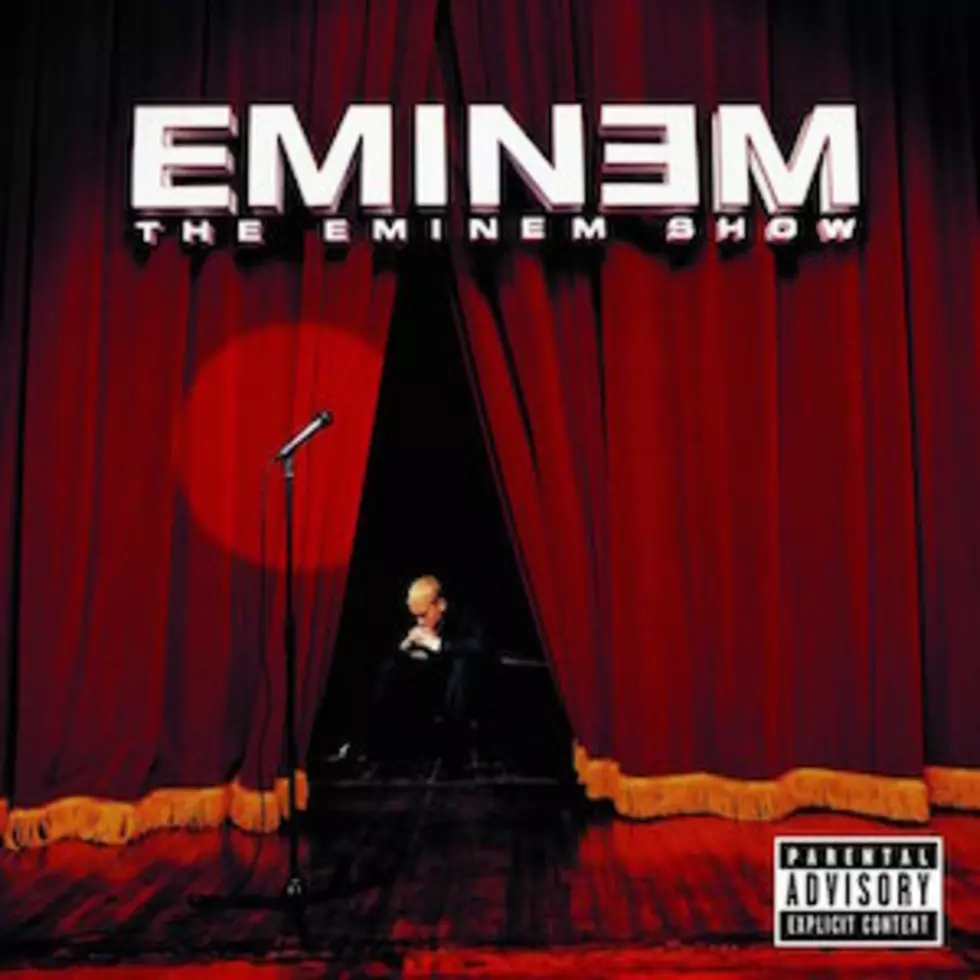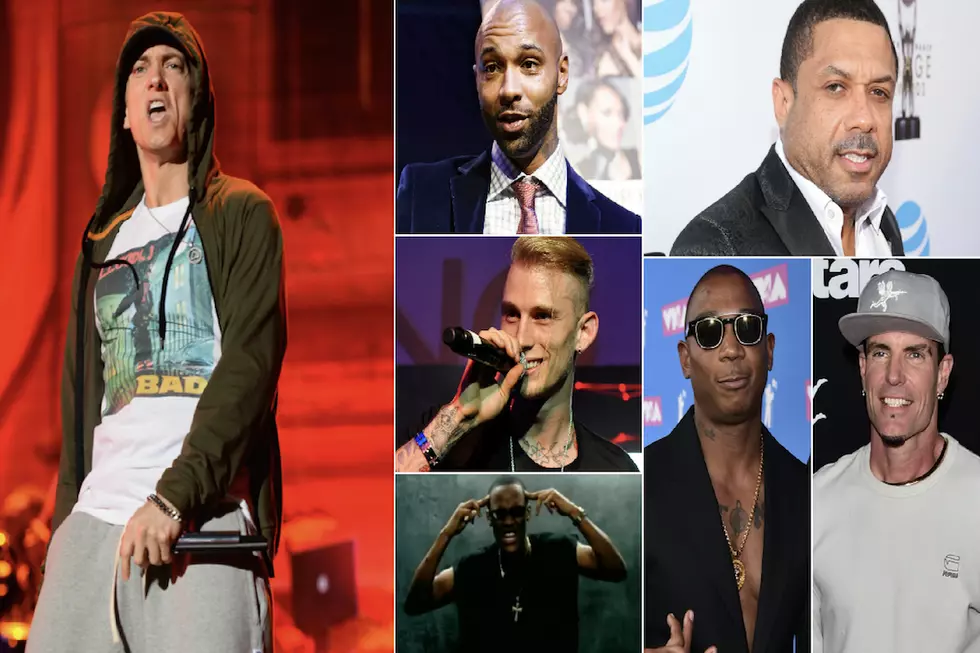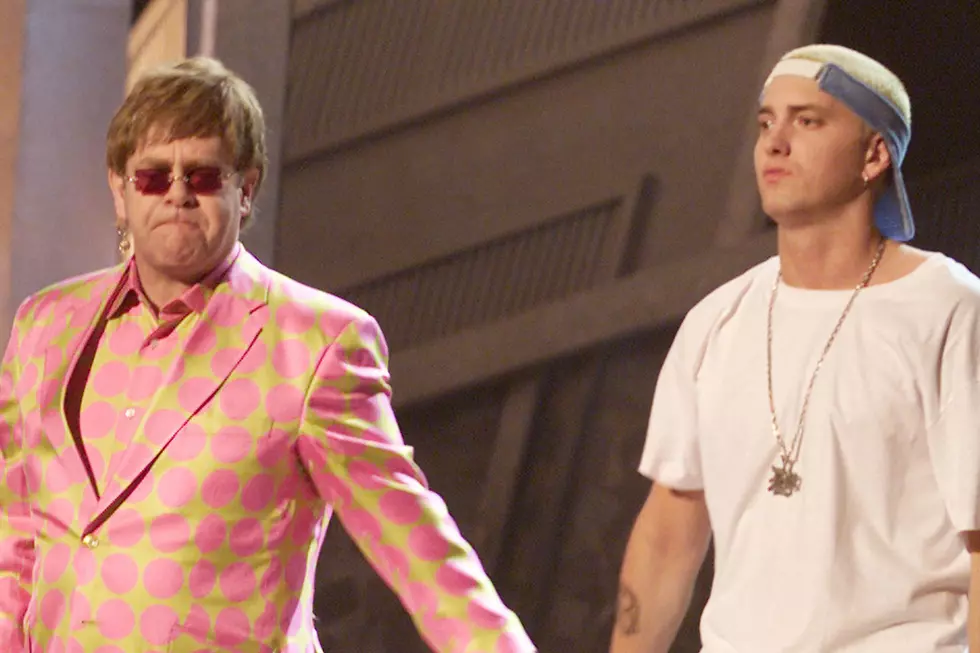
‘The Eminem Show’ Solidified Marshall Mathers’ Legacy As a Rap God
The number three has always held a special significance. In movies, you have great trilogies. In religion, you have the Holy Trinity. In basketball, you have the triple-double, in baseball, the triple-play. In hip-hop, when it comes to delivering three classic albums in a row, an artist joins the upper echelon--some of the most revered acts in the genre never put together a three-album hot streak. Eric B. & Rakim, Public Enemy, A Tribe Called Quest, 2Pac, and OutKast are among those who have pulled it off; and in 2002, Marshall Mathers--better known to the world as Eminem--would find himself joining those legendary ranks and solidifying his rep as not only one of the best, but also one of the most successful rappers of all time with the release of his third studio album, The Eminem Show.
Making his major label debut in 1999 with The Slim Shady LP, which showcased his polarizing but impressive brand of dark humor and lyricism (and introduced the world to his infamously over-the-top alter ego, Slim Shady); Eminem became an overnight star, with hit singles like "My Name Is," "Role Model," and the Dr. Dre assisted "Guilty Conscience" pushing the album past the four million sold mark. Despite the success and critical acclaim surrounding the album, there were still questions as to whether Em was a flash-in-the-pan in the vein of a Vanilla Ice, or if he possessed the staying power to become a dominant force in rap. That question would be answered the following year, when his follow-up album The Marshall Mathers LP was released. That album would prove that he was more than a novelty rapper with shock-value tactics, but an artist capable of conveying emotion, vivid imagery, and storytelling, with brooding singles like "The Way I Am" and "Stan" both noted as instant classics, in addition to deep cuts like "Kill You" and "Kim" upping the ante on his controversial subject matter and storyteller. Debuting at No. 1 on the Billboard 200 and breaking the first week sales record for a solo artist, with 1.76 million copies sold, The Marshall Mathers LP would announce Eminem as the biggest star in rap, and among the more bankable stars in all of music, and would be a career-defining effort.
Having gone from releasing an unsuccessful debut album (1996s indie release Infinite) to becoming one of the biggest selling music artists of all-time within the span of five years, by the end of 2000 Eminem was perched atop the rap game, and had already garnered all of the acclaim and the trappings that come with success as an entertainer. Attaining success is a feat in its own right and to be admired, but what separates the greats from the legends is the ability to find the inspiration, focus, and motivation to sustain that excellence after having accomplishing what had at one time seemed impossible. Taking a brief sabbatical from releasing albums while on the Up in Smoke, Family Values, and Anger Management tours throughout 2001, Eminem would return in 2002 with a body of work that would continue his reign as the biggest star in rap.
By 2002, bootlegging and piracy were becoming a thorn in the side of the music industry, with albums being leaked online prior to their official release dates. A number of high-profile albums were subject to illegal distribution on file-sharing sites, heavily impacting first-week sales figures for a number of artists. Being one of the more anticipated albums of 2002, The Eminem Show was not immune, as the album would be leaked 25 days prior to its original June 4, 2002 release date--one of the more notorious album leaks in history. In an attempt to minimize the damage, Interscope decided to release the album a week early on May 28, and when the smoke cleared, the first-week tally for The Eminem Show--while falling short of The Marshall Mathers LP--would move over 1.32 million copies, a testament to Em's stranglehold on SoundScan and the Billboard album chart.
After having Dr. Dre, Bass Brothers, and Mel-Man produce the majority of the material on his previous two albums, Eminem, who received co-production credits on both The Slim Shady LP and The Marshall Mathers LP, would take control of production on The Eminem Show, helming the boards or co-producing a majority of the album, the first step into his transition into being an established producer in his own right. Eminem would employ all of the tools of the trade learned under the tutelage of Dr. Dre and others, and Em would take a step back from verbally terrorizing celebrities and wallowing in gruesome fantasies of murder and mayhem. Instead, he would focus on addressing demons from his past, the influence his music and popularity had on suburbia, and proving himself to be one of rap's most formidable lyricists and songwriters.
"White America, I could be one of your kids/White America, little Eric looks just like this/White America, Erica loves my shit," Eminem boasts on "White America," the opening selection on The Eminem Show that examines the affect that his star turn has had on white children and teens from all walks of life, and their parents' concern as a result. Pointing to the hypocrisy of his detractors and the irony of their grievances, Eminem turns in an explosive offering that examines the root of his success and is foreshadowing of the where the Shady one's head is at on The Eminem Show. His strained and tenuous relationship with his mother had been documented throughout his earlier work, resulting in his mother filing a lawsuit for defamation against him following the release of The Slim Shady LP. Eminem broaches the topic once again on The Eminem Show standout "Cleanin' Out My Closet," which finds him attempting to find closure and provide context to the root of their issues with one another. Released as the second single from the album, "Cleanin' Out My Closet" would become one of the more unexpected smash hits of Eminem's career, peaking at No. 4 on the Billboard Hot 100, and pick up where previous classics like "The Way I Am" and "Stan" left off while trumping both in terms of chart success.
Eminem would score marginal hits with singles "Superman" and "Sing for the Moment," but much of the album's magic can be found in its deep cuts, all of which showcase Em's prowess, beginning with "Square Dance." Setting his sights on the Bush administration and the War on Terror, Eminem makes it clear he is in opposition to the Prez's politics, barking "Never been the type to bend or budge/The wrong button to push, no friend of Bush," and later threatening to "ambush this Bush administration/Mush the Senate's face and push this generation." Not faint of heart when it comes to addressing beef with rival rappers, Eminem also sets his sights on Canibus, his longtime rival, on "Square Dance," responding to subs Canibus made on his own song "Draft Day" with the couplet "I'll be brief, and let me just keep shit simple/Can-I-Bitch don't want no beef with Slim, nooo!" and ridiculing him for his political views and interest in enlisting in the United States army.
"Soldier" is an aggressive number that is among the better contributions from Em on the production tip; a reminder that he is not one to be trifled with when it comes to stringing together couplets that are equally jaw-dropping as they are technically proficient. "Never was a thug, just infatuated with guns/Never was a gangsta 'til I graduated to one/And got the rep of a villain, for weapon concealin'/Took the image of a thug, kept shit appealin'" Em delivers, running roughshod over the track and turning in one of his more masterful performances on The Eminem Show. Never one to rely heavily on guest appearances, Eminem takes a change of course on The Eminem Show, inviting a select group of artists to feature on the album. Obie Trice, a Detroit rapper Eminem inked to his Shady Records imprint and was famously shouted out at the beginning of The Eminem Show's lead single "Without Me," lays down an entertaining verse on "Drips," while D12 join Em for the riveting posse cut "When the Music Stops," both of which stand out as highlights on the album's tracklist.
Dr. Dre, who was embroiled in a beef with producer Jermaine Dupri, appears on "Say What U Say" and throws shots at his newfound rival, with jabs like "Fuck Jermaine!/He don't belong speaking mine or Timbaland's name" and "Over 80 million records sold/And I ain't have to do it with ten- or eleven-year-olds" making it clear that the bad blood between the two producers was definitely brewing. Among the various guests that grace The Eminem Show, the most powerful and memorable performance comes on the part of Nate Dogg, who lends his baritone to "'Till I Collapse," contributing a hook that serves as the crux of one of the album's finest offerings, while Eminem holds up his end of the bargain, dropping a trifecta of stanzas that capture him hitting on all cylinders. The Eminem Show featured Eminem altering the formula a bit and displaying artistic growth, but one constant throughout his career has been his adoration for his daughter, Haillie, who gets a pair of songs ("Haillie's Song" and "My Dad's Gone Crazy) dedicated to her, completing the cipher and rounding out the LP.
Fifteen years after its release, The Eminem Show is among Em's most successful albums, selling over 10 million copies and being his second album to earn Diamond certification from the RIAA, but is often overshadowed by The Slim Shady LP and The Marshall Mathers LP. There's nothing quite like the first time and The Slim Shady LP was definitely an unforgettable entrance for a relative unknown, and the amount of hype and the build-up leading to The Marshall Mathers LP has yet to be trumped by another rap artist. But The Eminem Show is arguably Eminem's greatest body of work to date and the most focused effort of his first three albums. Boasting everything from hit singles, record sales, pivotal deep cuts and introspection, The Eminem Show captured Eminem breaking ground as a producer, while simultaneously proving himself to be a rap god of the highest measure. Other albums may receive more fanfare or come to mind first when mentioning Eminem, however, The Eminem Show is in strong contention for being the crown jewel of his career, and is an undisputed classic.
Check out these classic videos from "The Eminem Show":
More From TheBoombox









